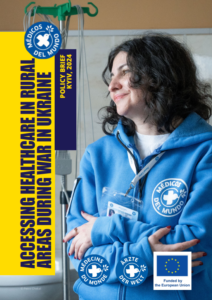 The war was an unprecedented test of the resilience of the entire system of governance and functioning of institutions in Ukraine. It was also a test for the healthcare system and the health of the people of Ukraine.
The war was an unprecedented test of the resilience of the entire system of governance and functioning of institutions in Ukraine. It was also a test for the healthcare system and the health of the people of Ukraine.
The Policy Brief “Accessing Healthcare in Rural Areas during the War in Ukraine” analyses the impact of the conflict on access to healthcare services in rural areas and proposes ways to address these problems.
Attacks on healthcare facilities and critical infrastructure have severely limited access to healthcare services in rural areas. Despite the government’s measures, the scale of the crisis was enormous. The war has had a direct impact on the deterioration of the health of Ukrainians, with an increase in the number of cardiovascular diseases and mental disorders. For example, a joint survey conducted by Médicos del Mundo and the Kharkiv Institute for Social Research found that 92 per cent of residents of the Velykyi Burlutskyi community in Kharkiv Oblast reported a significant deterioration in their health due to the war, citing cardiovascular and dental problems as their main concerns, as well as diabetes, strokes, cancer, and mental disorders such as post-traumatic stress disorder (PTSD) and panic attacks.
The war in Ukraine has severely disrupted primary healthcare services, with 61 percent of those trying to access them facing difficulties, according to a WHO health needs assessment in April 2023. Key barriers include the cost of medicines, time constraints and lack of transport. In addition, the migration of healthcare workers has exacerbated the problem: in 2022, the total number of healthcare workers in the national healthcare system decreased by 13.7% compared to 2021, resulting in the loss of 89,000 workers in just one year. Pre-existing structural problems in the healthcare system, such as insufficient budget and decentralisation reform, have also contributed to limited access to healthcare, especially in rural areas.
The healthcare reform that began in 2017 has created unequal access to healthcare for rural residents. Through the reform of Feldsher-Midwifery Posts (“FAPs”) into Health Posts, which operate irregularly, disrupting the continuous access to healthcare for rural residents.
The healthcare system has undergone reforms that have not considered the unique needs of rural areas, especially in terms of financing and accessibility. Factors such as the long distances that doctors must travel to reach patients and new challenges such as the reduction and zero coefficient of healthcare funding have exacerbated problems during the war.
Even before the conflict began, insufficient funding, poor roads and high transport costs made it difficult to access healthcare in rural areas. Active hostilities have exacerbated these barriers, and attacks on medical facilities and infrastructure have further isolated remote villages. The healthcare system in rural areas requires urgent attention from the government, humanitarian organisations, and international donors.
This Policy Brief has been produced by the Médicos del Mundo team with the financial support of the European Union. Views and opinions expressed are however those of the author(s) only and do not necessarily reflect those of the European Union. Neither the European Union nor the granting authority can be held responsible for them.
